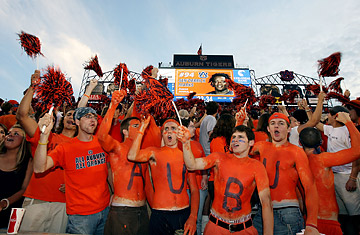
Auburn fans cheer at Jordan-Hare Stadium in Auburn, Alabama.
With Election Day about almost two weeks away, Barack Obama's and John McCain's volunteers are going door-to-door, looking to secure each and every vote in key battleground states and insure a big turnout of their faithful. Their presidential campaigns are busy strategizing about where to focus their resources, which homes and voters they should be targeted. Well, a new study suggests there is one key indicator that they might be overlooking, and it has nothing to do with politics. As the candidates battle it out on the campaign trail and on the airwaves, they might want to pay more attention to the fans of the universities battling it out every Saturday on the gridiron.
According to a paper published in this month's Journal of Sports Economics, entitled "Pigskins and Politics: Linking Expressive Behavior and Voting," residents that show overt support for their favorite college football team, in the form of displays like flags on the front yard, are nearly twice as likely as non-fanatics to hit the polls on Election Day. To reach this conclusion, a group of economists at Auburn University used that football-fueled college town as a laboratory. The researchers trolled a county database to find the addresses for nearly 4,000 residences in Auburn, and then last September, with football season in full swing, they drove through the city to observe which of these houses displayed front-porch support for coach Tommy Tuberville's Tigers.
Some 7% of the houses scouted by the researchers had at least one visible display of affection, which the authors cataloged in the paper's most entertaining paragraph. There were six different ways fans expressed their feelings for Auburn football, they noted. They were: "1) flying an AU flag, 2) affixing an AU pom-pom on one's mailbox, 3) affixing an AU sticker on one's mailbox, 4) placing an AU sign in one's yard, 5) placing an AU windmill in one's yard" and, in words that, sadly, will likely never appear in an economics research paper again 6) placing an inflated figure of Aubie [AU's school mascot] in one's yard."
"Some of them were festooned with all kinds of different stuff," notes Auburn economist David Laband, the lead author of the study. Using the records from the November 7, 2006 Election Day, the economists figured out how many properties housed a resident who voted that year. In the statistical analysis, they controlled for two variables. The first was the assessed value of the homes, since those with more expensive property probably have higher incomes, and richer people are more likely to vote. The second was the number of years the owner lived in the house. The longer you're entrenched in one place, the higher your stake in local affairs, which makes you more predisposed to punch a ballot on Election Day.
Laband and his crew crunched the numbers, and found that those with the football paraphernalia were almost twice as likely to vote. "I was very, very surprised," Laband says. Up to this point, most behavioral research has focused on the correlation between the likelihood of voting and displays of political expression — membership in a party, or "Vote Smith for Congress" signs on the porch. "These results show that different kinds of expressive behavior, voting and football fandom, are linked somehow, even if they don't have the common thread of politics," he says.
What can possibly explain this connection? For starters, it makes intuitive sense that a person who pledges allegiances to the local football team would be more willing to back a favorite politician. "In many ways, politics is a spectator sport in which you get to rank the teams, or the candidates, through a vote," says Clemson University economist Robert Tollison. Also, politics and sports are both ideal outlets for those seeking a communal experience. "If everyone knows you're an Auburn fan, you can talk about the games with other people, and argue about tactics and the like," says Tollison. "It's easy to join the conversation. If you vote, you can talk about your choices with other citizens, connect with people who share your preferences, and debate those who don't. You're also part of the conversation, the network." In other words, if you're a yapper, what's the difference between touting your tailback and your candidate's tax policies? And if you're a candidate looking to talk to that yapper, just look for the Ohio State Buckeyes or Florida Gators sign on the lawn — you might just score.
